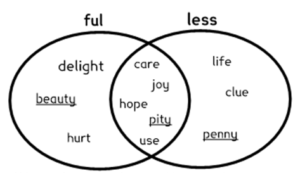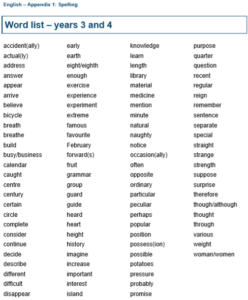11 May 2018
| homophones
This week, we’re recapping some spellings from Year 3 and 4. Because they can be a bit tricky, and because we must spell them correctly for our writing to make sense, they are very important. Despite this, many of us still make mistakes with these words in our writing. Children should practise spelling these words in preparation for a test on Friday 18 May 2018. |
| here / hear |
| where / were / we’re / wear |
| there / their / they’re |
| are / our |
| to / too / two |
| your / you’re |
| its / it’s |
| of / off |
| of / have (I shouldn’t have.) |
| which / witch |
04 May 2018
The spellings this week can all have the suffix -ful or –less added to them (some can have both). The underlined words have an extra rule to follow when adding the suffix: drop the y for an i.

04 May 2018
This week, Year One’s spellings are words ending in the suffix ‘ing‘ where no change is needed to the root word.
| jumping |
| talking |
| singing |
| asking |
| walking |
| hunting |
| playing |
| eating |
04 May 2018
This week’s spelling list is formed with ten words from the Year 3/4 statutory spellings list. There isn’t a pattern with these words but could you think of any fun ways to remember how to spell them? If you don’t know what any of the words mean, find out! There will be a spelling test on Friday 11 May.
| accident | calendar | difficult | early | group |
| island | minute | promise | strange | though |
04 May 2018
| “I before E except after C, when the sound is ‘ee’!”
This is a well-known spelling rule but it can still be very tricky. Here’s a list of words to learn that either follow or break this rule. The last three words are this week’s ‘Words of the Week’. We’ve been using them all week so you should now make sure you’re confident spelling them. You should learn all of these words in preparation for a test on Friday 11 May 2018. |
| achieve |
| conscience |
| convenience |
| foreign |
| mischievous |
| soldier |
| variety |
| abundance |
| relentless |
| fragile |
27 April 2018
The children have been asked to put the spellings that they were given last week into sentences. Another alternative is to link this in with our 2D shape learning. It would be great if the children could get creative with the words.
One possibility is to create shapes and write the word inside.
This spelling revision could link in with the homework set this week.
 Make your own word shape puzzle.
Make your own word shape puzzle.
Can you link your spellings into your shapes?
27 April 2018
This week, Year One’s spellings are words ending in ‘ed‘. The suffix ‘ed‘ changes a verb to past tense.
| jumped |
| talked |
| hunted |
| asked |
| walked |
| shouted |
| looked |
| yawned |
27 April 2018
This week’s spelling activity is a crossword using ten of the words on the Year 3/4 Statutory Word list. If you need help or support, come in and ask for a hard copy of this list or alternatively, it can be found online or below:

27 April 2018
We are looking at the suffixes -er and -est this week. The first four require you to drop the e from the root word before adding the suffix. The last four require you to double up the last letter before adding the suffixes.
| nice nicer nicest |
| large larger largest |
| wise wiser wisest |
| strange stranger strangest |
| thin thinner thinnest |
| big bigger biggest |
| sad sadder saddest |
| hot hotter hottest |
27 April 2018
For the rest of the year, Year 6 won’t have a specific list of spellings. Instead, they should think about the spelling skills they need to develop (from the list below) and create their own spelling practice. There will be a test each week and, along with this, we’ll discuss the sorts of spellings we’re finding more difficult.
- tion/ssion/sion/cian endings
- homophones
- ant/ent/ancy/ency/ance/ence endings
- adding prefixes
- adding suffixes
- unusual spellings
- ible/able/ibly/ably
- fer endings
- spelling rules
- tious/cious
- ough
- tial/cial endings